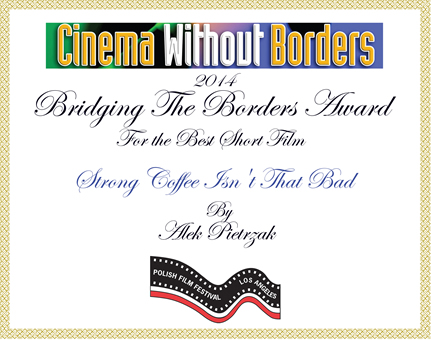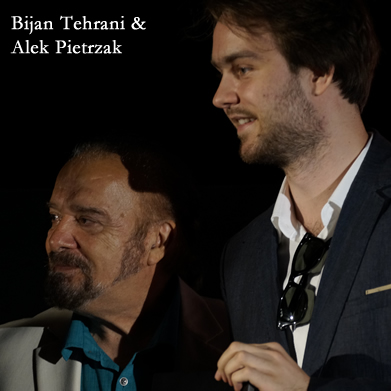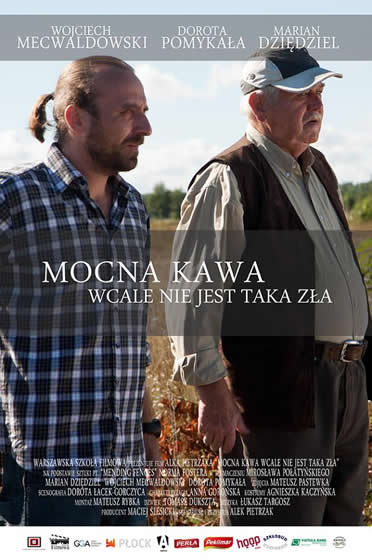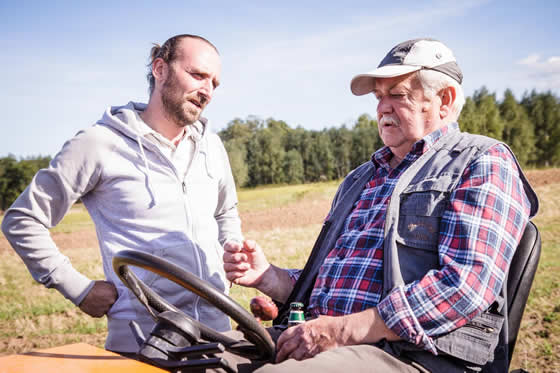 Strong Coffee Isn’t That Bad winner of Cinema Without Borders award for the Best Short Film at Polish Film Festival, LA, is about relationship between a father and a son. In this comedy-drama, the son comes back home after 18years abroad. Now you have two men that are too stubborn to admit their true feelings for each other.
Strong Coffee Isn’t That Bad winner of Cinema Without Borders award for the Best Short Film at Polish Film Festival, LA, is about relationship between a father and a son. In this comedy-drama, the son comes back home after 18years abroad. Now you have two men that are too stubborn to admit their true feelings for each other.
Alek Pietrzak director and writer of Strong Coffee was born in 1992 in Plock, Poland. Alek first graduated from the Music School in piano class. Then he studied at the Warsaw Film School and worked as volunteer at the Camerimage International Film Festival of the Art of Cinematography in Bydgoszcz.
Bijan Tehrani: How did you come up with the story of Strong Coffee?
Alek Pietrzak: I had this classes at my school about drama adaptation. I asked an actor friend of mine to send me a few stage plays, because I wanted to work on a few dramas for the homework we had. He sent me over 20 plays and I read them all and suddenly one of them made a great emotional impact on me.. I laughed and cried while reading it and I decided this is the story I want to tell. Half year of hard work and finally the 11th draft was ready to shoot Strong Coffee Isn’t that Bad.
homework we had. He sent me over 20 plays and I read them all and suddenly one of them made a great emotional impact on me.. I laughed and cried while reading it and I decided this is the story I want to tell. Half year of hard work and finally the 11th draft was ready to shoot Strong Coffee Isn’t that Bad.
BT: The story and characters are quite real and well developed, is the film or characters based on your personal experience?
AP: I had no personal experience about subject of this film. People often ask me how I come up with creating real characters and situations, while being so young and without any experiences. Actually I have my own way of experiencing life… but most of them comes from reading, watching, thinking, and talking to people and listening to their stories. Most of my experiences are from talking and discussing with people that are older and smarter than me.
BT: For a short film it has always quite challenging to deal with more than one main character, in Strong Coffee you have several characters and all are equally presented in a believable manner, how did you manage to do this?
AP: I think it`s a casting thing. Actors which were very talented and had a lot of good energy did it based on a good script… and the script was based on a good play.
 BT: How did you go about casting and how did you work with your actors? Did you had a lot of rehearsal time? Did you allow any improvisation on the set?
BT: How did you go about casting and how did you work with your actors? Did you had a lot of rehearsal time? Did you allow any improvisation on the set?
AP: I think casting is one of the most important factors in success of a film. Script and casting together make 70% of director’s job. When there is a good cast, you have more than 50% chances of succeeding. I knew who I wanted to work with and I managed to get them as they all agreed on playing in my movie after reading a script. But I thought a lot, especially about how to combine actors to get the best chemistry and relations. We had a few rehearsals before we started the shooting, but after that I have been reading the parts of the scripts for the next day with the actors and talk it through. There is always a place for improvisation but not I don’t allow everything to be improvised. I let improvisations around the dialog, scene topics and emotions in a particular scene. It’s like improvisation in music. I allow them to improvise, but only in G minor which is the tune of the scene. I think, when you do a good casting, your job as a director is not to destroy it on set… you are there to make actors feel safe… and if needed you bring them back into a good tune ( G minor metaphor ) or make them repeat something when they make a mistake and accidently play a wrong note.
BT: How did you go about choosing visual style of your film?
AP: Finding a visual style for the film was long journey and a hard work. I and my best friend – DoP – Mateusz Pastewka watched plenty of movies, go through hundreds of pictures, and photographs. We were inspired visually mostly by few films such as “Straight story”, “Arizona Dream” and Polish film by A.Jakimowski “Zmruż oczy”. I loved the simplicity of those pictures and on the same time their spphisticated and strong style of their directors. I wanted to go wide screen. I wanted to give it more space in the frame, more wind to give the taste of countryside. I used a lot of long shots with both actors in wide frame, to show how close and how far they are from each other. I also didn’t want to use only one single style film language in Strong Coffee. I tried to use my language and camera movements adapted to the dramaturgy. There are many things I would change and do better if I had a chance to make this film again. But this is my student work. When am I going to commit my mistakes and learn from them if not from a school project?
BT: Have you ever attended Polish Film Festival LA before? What do you think about this festival?
AP: I have never been personally at Polish Film Festival in LA, but this festival has shown my short films in past two years. Two years ago there was screening of my two min short called “Silence” and last year screening my ten min movie called “Dr. Jazz”. This year festival has invited me to come LA with Strong Coffee and I am very happy to be here.
BT: What is your next project?
AP: As year by year as you see I go step forward. From two min movie to ten and now to a fifty minutes short or semi feature length film. So now when I come back from LA I have castings for my first feature film. It’s going to be comedy/drama about transsexual women. I can’t wait to do it. I love what I am doing and I already have plenty of ideas for new movies after this one…

